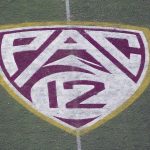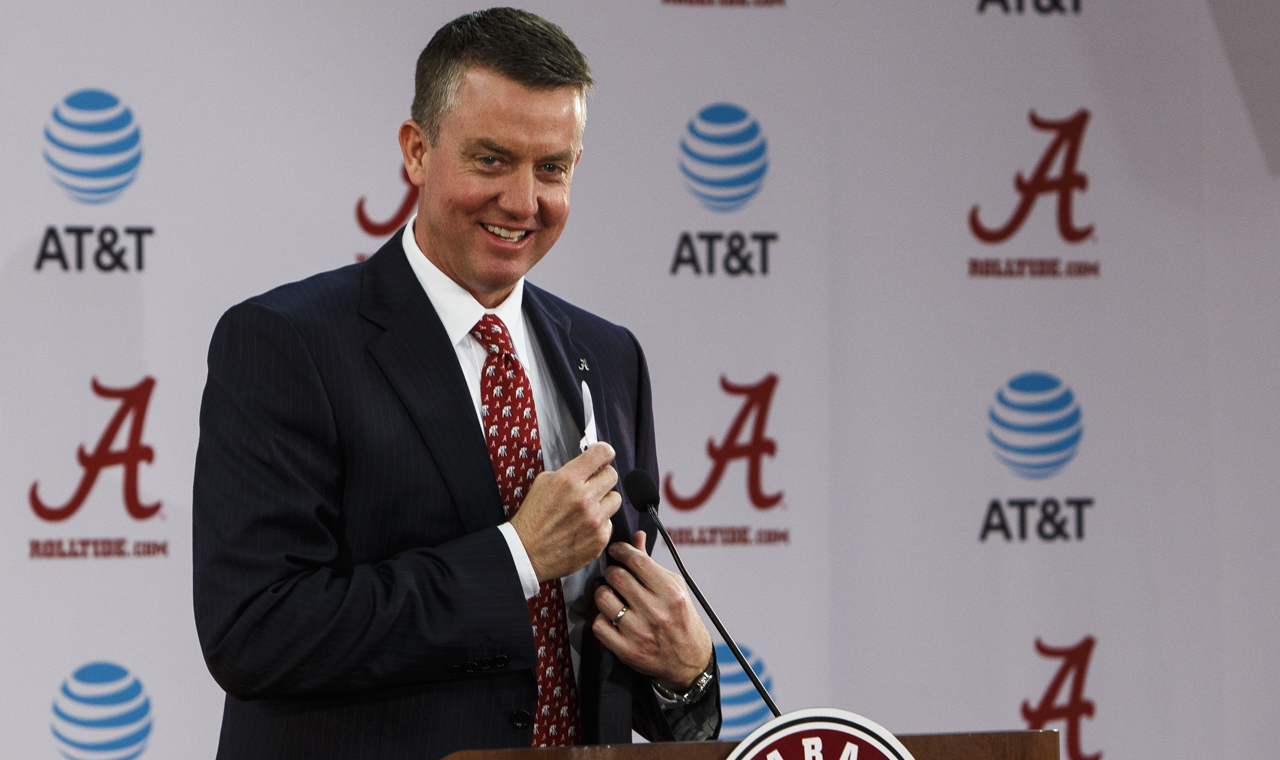As the final Pac-12 championship game drew close, the Hotline sought context from a voice unlike any others — from someone who not only watched the conference collapse but felt the collapse, from an outsider who’s also an insider, who has the Pac-12 in his DNA but recoiled at the internal rot.
We sought context from Greg Byrne.
At first, Alabama’s athletic director was hesitant to share his thoughts on the life and death of the Pac-12.
After all, Byrne left the conference seven years ago and wasn’t privy to the inner workings during the existential crisis that began with the departures of USC and UCLA on June 30, 2022, and ended on Aug. 4, 2023, when five more schools left.
Eventually, he agreed to answer questions via email.
Byrne’s perspective on the topic is unique within college athletics.
He attended Sheldon High School in Eugene while his father, Bill, served as Oregon’s athletic director. He went to Oregon and graduated from Arizona State. He worked in the Oregon and Oregon State athletic departments, then later ran the show at Arizona.
The roots run deep.
But in the early 2010s, during his tenure in Tucson, Byrne became concerned about the present and future directions of the conference.
He saw the strategic missteps from the inside and attempted to sound the alarm despite a top-down structure that pushed the athletic directors aside.
Byrne left Arizona for Alabama in 2017 and watched the landscape shift. As college sports emerged from the pandemic, the Pac-12 was left vulnerable to the forces of realignment.
With wide eyes and a heavy heart, Byrne tracked the demise from 2,000 miles away.
His perspective helps close the circle as Pac-12 football takes its final breath.
What are your earliest memories of Pac-12 football?
One of my first, very young memories was when Arizona and Arizona State left the Western Athletic Conference to join what would become the Pac-10. I was already interested in the workings of college sports, and I remember my dad talking about it because he was the head of the Lobo Club at New Mexico.
After that, it was when I attended the 1982 Oregon-USC football game at the Coliseum, when my dad was going to work for the Ducks.
From there, it was growing up around the Oregon athletics department. I will never forget being a ballboy on the Oregon State sideline the day of the famous 0-0 tie during the 1983 Civil War.
Can you describe what the conference has meant to your life?
Like so many people, the Pac-10/12 meant a lot to my family and me. Growing up while my dad was the athletic director at Oregon, I loved traveling to all the campuses for the countless sporting events with my dad and mom.
My high school basketball team, Sheldon High School, would bus up to Pullman each year for Cougar Cage Camp. They had a very young coach named Kelvin Sampson.
My brother went to Stanford, and I attended Oregon and graduated from Arizona State. I worked at Oregon and then Oregon State — Jonathan Smith was our quarterback — before eventually becoming the athletic director at Arizona.
As someone who has the Pac-12 in your blood, what are your emotions this week knowing Pac-12 football will cease to exist (as we know it) following the title game on Friday night?
Over the past few years, we’ve been watching a lot of change sweep across college athletics. Unfortunately, one of those changes is what has occurred with the Pac-12.
So much of college sports is about tradition, history and legacy, and despite there not being a Pac-12 anymore, we can appreciate the memories and celebrate the history.
I’m fortunate that I have a lot to focus on with our SEC championship game against Georgia this weekend, so I haven’t spent a ton of time dwelling on it.
However, when my wife, Regina, and I were watching the Cal-UCLA game Saturday night after I got back from our game at Auburn, we realized it was the final Pac-12 regular season game. We both felt sad about what that represented.
When did you first start to suspect the conference was headed down a troubling path? Which other athletic directors shared your concerns?
Over time, more of the athletic directors were concerned, but initially, it was Utah’s Chris Hill, Oregon State’s Bob De Carolis, a couple of others and me.
One of the first surprises was when we found out that the ADs and presidents/chancellors would no longer meet together. Traditionally, it was considered normal for there to be collective voices at the table to ensure those who were closest to the daily athletics experience could inform decisions that affected their programs directly.
This change siloed off the ADs, and the perception was things would be managed at the conference and CEO level without AD input. We finally pushed for time together at least once a year, but the narrative in the room was often controlled by only a few voices.
The next thing that got our attention was the spending on the conference office and the move to downtown San Francisco. We were very aware that every dollar spent at the conference level was a dollar that didn’t get to our student-athletes. When asked to review the expenses for the new conference offices, we were not given any pertinent information.
We recognized the need for a stable conference to support us, and we had secured the largest television agreement that, for a very short time, put us ahead of our peer conferences. From my previous time in the SEC, I knew that commissioner Mike Slive, along with Big Ten commissioner Jim Delany, would not sit idly by and not respond. And they did respond, to the benefit of the SEC and Big Ten, respectively.
No matter where you are, you have to make challenging financial decisions for your department. There is a widespread misperception that athletics departments have an unlimited supply of money. That is simply not the case, even at places like Alabama.
Nevertheless, you want to provide your student-athletes with the best resources to help them be successful academically, personally and athletically while also being competitive and offering an enjoyable fan experience. Revenue from the conference is a big piece that helps fund those efforts.
The other red flag was when we were given high, medium and low financial projections for the Pac-12 Networks — and none of them were ultimately met.
From there, two narratives began to emerge: 1) The Pac-12 Networks were focused on exposure, and there wasn’t any promise of significant revenue, and 2) The Pac-12 Networks were turning a profit.
Many of us did not believe those two narratives. We agreed exposure was an important part of the plan, but so was prioritizing a positive revenue stream for our campuses. We believed that the Networks were not actually turning a profit and were never given a clear answer on revenues vs. expenses, no matter how much we pushed.
The schools also bought back our Tier 3 rights from our multimedia rights partners for the Pac-12 Networks, so the Networks could show our Tier 3 games. That was never accounted for when we would ask what net revenues were, no matter how many times we insisted that should be part of the equation.
What issues became the most worrisome to you?
There was a real disconnect between the conference office and us. It felt like our opinions were not valued, and there was a lack of collaboration with the athletics directors since we worked with the student-athletes, coaches, staff and fans on a daily basis.
While there were some positive and innovative steps taken by the conference — for instance, moving the men’s basketball tournament to Las Vegas — you still have to keep the main thing the main thing: Serve the campuses, athletics departments and the young people in our programs.
Pro sports are very different from collegiate sports. You have 20-plus teams at each school with more than 600 young athletes participating. You are spread thin serving all of those people and, if you are struggling with your conference at the same time, it is frustrating.
We have seen a number of people with very different, very successful professional backgrounds who struggle when they enter the college space. It’s just a different world, with a broader set of goals that goes far beyond simply measuring revenues. I’m guessing I would struggle in the pro market because I don’t have any background in it.
How did you handle your concerns within the conference?
Our AD group talked a lot. I would also talk to my president at Arizona. Dr. (Ann Weaver) Hart was very supportive of our concerns, and we would all talk very directly and honestly to the conference office.
Were you interested in becoming commissioner when Larry Scott stepped down in the winter of 2021 and, if so, did you have any conversations with conference executives or the search firm? Did that process develop at all?
They did not reach out to me and I did not pursue it.
The fans and support at the University of Alabama are not like anywhere else in the world. Regina and I love the university, and the coaches and our student-athletes are like family. The passion in the SEC is unrivaled. I couldn’t imagine going anywhere else.
My ability as an AD to have a meaningful relationship with so many of our 600-plus student-athletes, and to have a concrete impact on their lives, has always been important to me.
What internal characteristics/weaknesses have made the Pac-12 vulnerable to collapsing under the shifting dynamics of college football?
It’s hard to pinpoint one thing, but I think as the Pac-12 struggled on the football field, the interest simultaneously waned in a few other areas.
First, fans weren’t showing up with the same fervor. Secondly, local kids may not have been exposed to football as much and didn’t play in the same numbers as compared to the rest of the country. That has an effect on the number of future recruits and high-level athletes who are playing the game, as well as the alumni and fan base who follow the teams.
Some of the best young athletes who grew up out west and who often would have played for a Pac-12 school sometimes looked elsewhere — including Alabama.
At Alabama, many of our student-athletes decided to compete here because of our ability to support our young people at the highest levels, academically and athletically, with the best medical, nutritional, and emotional support for their personal development.
What was your reaction to USC and UCLA announcing they were leaving for the Big Ten?
I was disappointed but only slightly surprised.
When I was at Arizona, we were contacted twice by another conference, but we felt it was important to stay in the Pac-12 from an academic, recruiting and student-athlete experience standpoint.
However, I assumed that if we had been contacted, there were most likely others who were contacted, too.
Over the course of the 13 months that the Pac-12 tried to sign a media deal, were you concerned it would collapse? And if so, why?
Not being in the middle of it, I wasn’t sure what to think. But I did read about it where I could.
What were your emotions on Aug. 4, when five schools announced they were leaving and the demise became official?
Once again, it was sad to see. However, I know the pressures you feel to put your school in the best possible position are significant, and I won’t criticize the individual institutions doing what they felt was best for their programs and student-athletes.
What does the demise of the Pac-12 mean to college sports generally and college football specifically?
For college sports to be as strong as possible, it needs to be relevant from coast to coast.
Just last weekend, there were so many incredible games, environments and outcomes. ESPN’s Scott Van Pelt had a wonderful tweet about how great college football is:
“Even without upsets, this sport is the absolute greatest. Nothing matches the level of abject lunacy that CFB provides. The wait is forever then the season is gone in a blur and a blink and I love it so much.”
I couldn’t agree more. There’s a passion for college athletics that can’t be matched.
Will you be watching the Pac-12 championship on Friday night in Atlanta?
I have a dinner Friday night in Atlanta, but I will catch the second half back at the hotel.
*** Send suggestions, comments and tips (confidentiality guaranteed) to pac12hotline@bayareanewsgroup.
*** Follow me on Twitter: @WilnerHotline
*** Pac-12 Hotline is not endorsed or sponsored by the Pac-12 Conference, and the views expressed herein do not necessarily reflect the views of the Conference.
Related posts:

(AP Photo/Ralph Freso, File)
Brandon Huffman – Pac-12 Football Recruiting Notebook Hotline mailbag: WSU and OSU on the brink, UCLA’s compliance with AB-1887, why Oregon got left behind and loads more
Hotline mailbag: WSU and OSU on the brink, UCLA’s compliance with AB-1887, why Oregon got left behind and loads more  VIDEO – Jon Wilner and Brad on Pac-12 next steps
VIDEO – Jon Wilner and Brad on Pac-12 next steps  Hotline mailbag: Detailing the Pac-12’s liabilities, the ‘Pac-2’ and the MW, future of the NW rivalries, CFP rules, Bay Area regret and more
Hotline mailbag: Detailing the Pac-12’s liabilities, the ‘Pac-2’ and the MW, future of the NW rivalries, CFP rules, Bay Area regret and more
